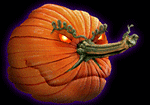 Yeah, sure, I'll tell you what you want to know. The whole...gasp...ungodly thing: I was a TV horror host. Yeah, me. The ordinary guy without a monster suit. I was one of those who introduced monster flicks on Saturday night. Horror classics and non-classics sixty minutes before the arrival of the Witching Hour. Yeah, let the truth be heard throughout the dungeon, throughout the castle of madmen: I was a "Creature Features" man. John Stanley, I Was a TV Horror Host: Memoirs of a Creature Features Man.
Yeah, sure, I'll tell you what you want to know. The whole...gasp...ungodly thing: I was a TV horror host. Yeah, me. The ordinary guy without a monster suit. I was one of those who introduced monster flicks on Saturday night. Horror classics and non-classics sixty minutes before the arrival of the Witching Hour. Yeah, let the truth be heard throughout the dungeon, throughout the castle of madmen: I was a "Creature Features" man. John Stanley, I Was a TV Horror Host: Memoirs of a Creature Features Man.
Creature Features was a popular syndicated horror show that began in the 1960's. Each local TV show usually had its own horror host, the person responsible for introducing the classic Universal Studios horror movie, Roger Corman B-movie, Japanese horror and sci-fi movie, British horror movie, and just about any horror movie not nailed down under a coffin-lid.
In New York City, one horror host was The Creep (Lou Steele) on Channel 5. Except for his sunglasses and sinister attitude, Steele played The Creep without a dungeon backdrop or creepy make-up. I fondly recall spending a lot of time with The Creep and I'm a better person for it.
I probably would be a much better person had I been lucky enough to watch John Stanley's Creature Features on KTVU in Oakland, California. Although he sported the usual horror host trappings of a tomb-like set and outrageous throne chair, Stanley appeared as a normal guy who knew way too much (insert jealousy here) about the movies he presented. He also had the most wonderful and interesting celebrity guests to chat with (insert more jealousy here).
He's written an informative and very enjoyable book about his experiences on Creature Features called I Was a TV Horror Host. After I started reading it, I knew I had to ask him to step into the closet for a little chat; and find out all his secrets, hehe.
 Just how does a long-standing journalist like you land the respected role of TV Horror Host for six popular years on Creature Features?
Just how does a long-standing journalist like you land the respected role of TV Horror Host for six popular years on Creature Features?
While I deal with this on pages 54-55, let me add that I would never have become a TV personality had I not personally known Bob Wilkins for more than 10 years. Through his program we had become good friends. Bob had always considered me an important contact at the San Francisco Chronicle and I believe that once he knew he was leaving the show, he saw no reason why he shouldn’t suggest me for the job. In all honesty, it caught me totally by surprise. If I harbored it within me, it was a deeply disguised secret. And yet, once Bob had suggested it, I must have decided, "Why not."
Actually, what few people know is that Bob was leaving Creature Features to work for George Lucas as his merchandising guru. George and Bob had met in the early days of STAR WARS and a friendship had been struck, which later led to the job offer to Bob. However, there had not been a clear meeting of the minds. Bob thought he would be working in the San Francisco-Bay Area — but it turned out Lucas, who was then living in Marin County, wanted him to move to Los Angeles to take over marketing there.
Bob, who had his own advertising agency, didn’t want to give it up and finally had to turn down the Lucas offer.
Even with that pitcher of water, filling Bob Wilkins shoes must have presented some daunting challenges: how did you surmount them?
The "daunting challenges" were formidable. I think I succeeded because, like Bob, I was not a professional in the usual sense. We did look alike in some ways (we both wore glasses, and I wore suits and ties on occasional, just as Bob did) and we both had a sense of humor about the show. I was also very knowledgeable about the movies, and I think that came across from the very beginning.
As difficult as it was in the beginning, I kept going back week after week, not afraid to try new stuff and to be "myself" whatever the hell that was going to be. I remember in June, six months after starting, that while I was doing a Chuck Norris-related show, I felt very good about things for the first time, and decided I was beginning to settle in. Yes, like all beginners I made my share of mistakes, but I corrected them quickly and kept moving ahead, not looking back.
You grew up reading EC Horror Comics, pulps, and novels of every kind. What drew you to them, and how have they influenced you (beyond being a noted TV Horror Host, that is)?
I started reading comics when I was around 6 years old. By the time I was eight I was heavily into the Hardy Boys juvenile mystery novels and by the time I was nine I was reading pulp magazines I found in the comic book store I always frequented. Ten and eleven were exciting years — I discovered Ray Bradbury and other science-fiction / fantasy writers. I started becoming more sophisticated when I bought Astonishing Science Fiction, although I refused to give up Planet Stories. The E.C.s hit me around ten, and definitely drove me to read more and more. MAD had a terrific impact on me, as did the imitation comics.
From Christopher Lee, who almost walked out on you, to the casts of Star Wars and Star Trek, how did you manage to get so many fabulous celebrities on Creature Features?
The San Francisco-Bay Area is a major television market and hence drew more than its share of celebrities for the purposes of promoting books, new movies and TV series. I had been interviewing celebrities for the Chronicle for 15 years when I joined KTVU-TV, so I had many contacts in the Bay Area and in Hollywood. I could reach key players at the movie studios and at the TV networks.
In most cases they were calling me. George Takei would call on Monday to ask if he could be on the show that week, knowing my taping was always Friday, and knowing I would never say no. Just one example of the tail wagging the dog.
There was never a shortage of important people and faces. And many came from the surrounding cities, a haven for sci-fi and fantasy and mystery writers. And let’s not forget that by my days on TV, George Lucas was an active force in nearby Marin County. Special effects guys and wanna be special effects guys were everywhere in those days.
How do you prepare for an interview?
Interviewing is an art onto itself. There are two basic kinds of questions one should have: the specific queries about an individual’s life and career, and a generic list that you can fall back on if needed. Let me elaborate. I would always try to pick up esoteric info on the subject, little known facts that I could casually drop. This always impressed the individual and let them know that I had done my home work and was ready for the conversation. This put them at ease and ready to open up to everything I asked. Call it a matter of trust, because there are some actors who distrust the media.
I was never caught groping for a question. Of course, many questions were geared to the moment: why did you make your latest movie and tell me why you chose to play the character the way you did? Keep it very specific for the latest info you can print about somebody.
On the other hand, the generic questions are good for filler, especially if someone isn’t too responsive and you start to run out of material, or directions in which to move the interview. That’s when the generic questions come in handy: such as, what do you attribute your success too? What other artists inspired you? What would you like written on your gravestone? What is it like to be 86 years ago? In some cases, as with George Burns, I found that both sets of questions evoked great answers.
One weaves in and out of as many subjects as possible, covering past present and future. I always carried a notebook in my coat pocket and was ready to interview anyone anywhere, sitting down or standing up. Sometimes I used a tape recorder if I felt it was going to be a long interview.
I remember one time I was interviewing Glenn Ford but had not place to put down the recorder, so he volunteered to hold it while we spoke. Another time I interviewed Peter Graves of MISSION: IMPOSSIBLE but discovered when I got home the tape was blank. So I made up a story where I was given the "assignment" of tracking down Graves and "sneaked" into the studio to carry out my "mission." It became a satire of the TV show. So I ended up writing a story with no exchange of dialogue. The studio loved it because it was different. When I interviewed Adam West for BATMAN I wrote the final story in the form of a screenplay.
Which interview was the most memorable, and which was the most difficult?
Among the memorable interviews were Jimmy Stewart, Fred MacMurray, Mae West, Robert Mitchum and other larger-than-life entertainment figures of a now-bygone movie age. I remember meeting Harrison Ford one time and tensing up: My God, I was standing in front of Indiana Jones! But usually I kept my cool and was as professional as I could be.
A hard but fascinating interview was Irwin Allen, who is not in I WAS A TV HORROR HOST. He is definitely going to be in the sequel book. After 15 minutes he asked me to leave his office. He apparently was offended because I was asking harder questions than he wanted asked. I didn’t think they were hard or rude or embarrassing at all. The chemistry just didn’t work. That was the only time anything like that happened to me. Most celebrities are looking for the publicity and if you have a good reputation that precedes you, everything should go off without a hitch.
How did your memorable and witty minimovies come about? What did it take to produce them?
I had made 8mm movies when I was a kid – a Western, a war movie, a crime drama, etc. Then I advanced to 16mm short subjects, and finally made one feature film NIGHTMARE IN BLOOD, which was made in 35mm and distributed to theaters. So I had a movie-making background when I started Creature Features.
I simply brought what I had learned to the idea of making short 16mm (later tape) "minimovies" to promote a new location (wax museum) or movie (Christine), in which a "killer car" pursues me. It started when I drove through a graveyard in a hearse with Angus Scrimm and Don Coscarelli as I interviewed them. I wish I could have made more but time was limited for these little gems. The oddest was CASABLANCA, shot in a Moroccan restaurant.
Why are TV Horror Hosts still revered by fans of the genre?
The reason Creature Features is still so fondly remembered today by the generations that grew up watching the show is that it evokes pleasant and nostalgic memories of childhood. Each individual I meet at a convention or personal appearance recounts a different set of circumstances, but each story is rooted in the same kind of memory: at home with other members of the family, eating and drinking something, perhaps tucked into bed – watching Creature Features.
I was surprised to read that one of your cherished collections is comprised of Arkham House books. Who’s your favorite horror author, and non-horror author, and why?
August Derleth started Arkham House, a specialty book outlet that started with H. P. Lovecraft novels. I discovered these books in the 1960s and started buying up as many editions as I could. I don’t have some of the more valuable ones, but those that I do have continue to grow in value. This is where I also discovered Robert Bloch, who is one of my all-time favorite writers. Ray Bradbury remains the king of all the writers. He so inspired me when I was becoming a teenager.
On a personal note, Something Wicked This Way Comes is my favorite horror novel. I was greatly disappointed by the filmed version as it failed to capture the beauty and terror of the novel on many levels. May I ask what your impression of the film is?
Yes, SOMETHING WICKED THIS WAY COMES never lived up to the novel, although it’s an interesting attempt. A couple of publicists for Disney told me the production was troubled from the outset, and was one of the last Disney efforts before the studio was sold and "remodeled" to accommodate a changing world. Too bad.
What are your favorite horror films?
My favorite horror films would include THE DAY THE EARTH STOOD STILL and Howard Hawks’ THE THING (FROM ANOTHER WORLD). I grew up in a different time and place, where graphic horror was not yet permissible on the screen. Special effects were limited in those days, so story and character often dominated. For later in life I think ALIEN is a classic turning point for movies. War movies have had a profound impact on me. I think Sam Fuller’s THE STEEL HELMET and FIXED BAYONETS are classics for their time and place.
Why didn’t you ever hold a cigar during the show?
I have never touched a cigarette or cigar or "joint" my entire life and never will. When I was a kid my mother used to crush her cigarette butts into ashtrays, and it was the most sickening sight I had ever seen. I was even afraid to walk barefoot on a beach, lest I step on a discarded butt. Call it a phobia or obsession. The cigar, in Bob Wilkins’ case, was merely a prop, something to hold on to to help him alleviate his tension.
What’s the one question you would love to be asked, and what’s your answer?
Ask me about Ray Bradbury’s "Sense of Wonder." I love to describe to my Elderhostel classes that we are all born with a sleeping child within us and as we mature, and discover all the great things of life (sex, food, drink, movies, music, art, books, etc.) parts of that child come awake, until finally we have thriving within us our "Sense of Wonder." John, be certain yours never falls asleep. (ZC Note: There is a wonderful and revealing tribute to Ray Bradbury in I Was a TV Horror Host.)
 What else do you have up your sleeve for the future?
What else do you have up your sleeve for the future?
For the future, I hope to write the seventh edition of THE CREATURE FEATURES MOVIE GUIDE. I stopped a few years ago to begin teaching Elderhostel classes, but now want to go back and start seeing one or two movies a day again, like I used to. I also have a sequel planned, RETURN OF THE TV HORROR HOST, because there are still so many untold stories and exclusive interviews I would like to bring together into another anthology like the current one.
I have interviews with Christopher Reeve, Noel Neill, Kirk Allyn for SUPERMAN, I have a chapter on the horrors of war in the movies, and so much more I could go on endlessly. Then I would like to do a book about the super-stars I have met and some of the lesser-super stars who still made their impact on movies and TV. The book would consist only of my exclusive material in an historical context. Time will tell.
I do enjoy the challenge of writing and editing and laying out books, even though the business aspects are sometimes overwhelming. I’ve always managed to come out in one piece. Knock on wood.
I enjoyed my years as a horror host, and I especially enjoyed writing for a major newspaper for 33 years. It was a childhood dream come true. (I knew from the time I was nine or ten that I wanted to be a writer of some kind.) My movie-making aspirations didn’t quite come to full fruition, but I’m still glad I had an opportunity to make a few shorts and one feature. That’s more than some folks can say who harbor similar dreams. I guess I've always been willing to take some career rest to take a new step into a new creative area.
Thanks John for joining us in the closet! You can order I Was a TV Horror Host: Memoirs of a Creature Features Man at John's site, http://www.stanleybooks.net/.
To learn more about the rich history of TV Horror Hosts, go to E-Gor's Chamber of TV Horror Hosts.



 Tell us about your work on The Dead Matter. What was the experience like being "The Narrator?"
Tell us about your work on The Dead Matter. What was the experience like being "The Narrator?"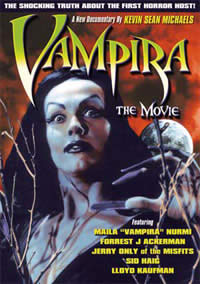
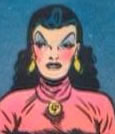 Using her love for comics, cartoonist Charles Addams, and bondage photographer and artist John Willie, Nurmi set about to create a "glamor ghoul." She mixed the sensual power of Terry and the Pirates' Dragon Lady, the ghoulish, bizarre charm of the Addams Family, and the
Using her love for comics, cartoonist Charles Addams, and bondage photographer and artist John Willie, Nurmi set about to create a "glamor ghoul." She mixed the sensual power of Terry and the Pirates' Dragon Lady, the ghoulish, bizarre charm of the Addams Family, and the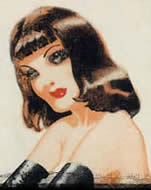 fetishistic allure of Willie's tightly-bound leather ladies in ecstasy (or distress) to create the first Goth chick on the television screen.
fetishistic allure of Willie's tightly-bound leather ladies in ecstasy (or distress) to create the first Goth chick on the television screen.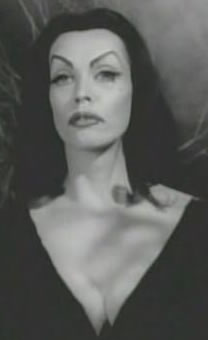




 Yeah, sure, I'll tell you what you want to know. The whole...gasp...ungodly thing: I was a TV horror host. Yeah, me. The ordinary guy without a monster suit. I was one of those who introduced monster flicks on Saturday night. Horror classics and non-classics sixty minutes before the arrival of the Witching Hour. Yeah, let the truth be heard throughout the dungeon, throughout the castle of madmen: I was a "Creature Features" man. John Stanley, I Was a TV Horror Host: Memoirs of a Creature Features Man.
Yeah, sure, I'll tell you what you want to know. The whole...gasp...ungodly thing: I was a TV horror host. Yeah, me. The ordinary guy without a monster suit. I was one of those who introduced monster flicks on Saturday night. Horror classics and non-classics sixty minutes before the arrival of the Witching Hour. Yeah, let the truth be heard throughout the dungeon, throughout the castle of madmen: I was a "Creature Features" man. John Stanley, I Was a TV Horror Host: Memoirs of a Creature Features Man. Just how does a long-standing journalist like you land the respected role of TV Horror Host for six popular years on Creature Features?
Just how does a long-standing journalist like you land the respected role of TV Horror Host for six popular years on Creature Features?
